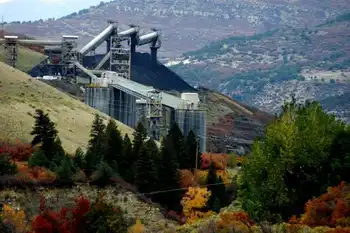Yukon SMR Feasibility Study examines small modular reactors as low-emissions nuclear power for Yukon's grid and remote communities, comparing costs, safety, waste, and reliability with diesel generation, renewables, and energy efficiency.
Key Points
An official assessment of small modular reactors as low-emission power options for Yukon's grid and remote sites.
✅ Compares SMR costs vs diesel, hydro, wind, and solar
✅ Evaluates safety, waste, fuel logistics, decommissioning
✅ Considers remote community loads and grid integration
The Yukon government is looking for ways to reduce the territory's emissions, and wondering if nuclear power is one way to go.
The territory is undertaking a feasibility study, and, as some developers note, combining multiple energy sources can make better projects, to determine whether there's a future for SMRs — small modular reactors — as a low-emissions alternative to things such as diesel power.
The idea, said John Streicker, Yukon's minister of energy, mines and resources, is to bring the SMRs into the Yukon to generate electricity.
"Even the micro ones, you could consider in our remote communities or wherever you've got a point load of energy demand," Streicker said. "Especially electricity demand."
For remote coastal communities elsewhere in Canada, tidal energy is being explored as a low-emissions option as well.
SMRs are nuclear reactors that use fission to produce energy, similar to existing large reactors, but with a smaller power capacity. The International Atomic Energy Agency (IAEA) defines reactors as "small" if their output is under 300 MW. A traditional nuclear power plant produces about three times as much power or more.
They're "modular" because they're designed to be factory-assembled, and then installed where needed.
Several provinces have already signed an agreement supporting the development of SMRs, and in Alberta's energy mix that conversation spans both green and fossil power, and Canada's first grid-scale SMRs could be in place in Ontario by 2028 and Saskatchewan by 2032.
A year ago, the government of Yukon endorsed Canada's SMR action plan, at a time when analysts argue that zero-emission electricity by 2035 is practical and profitable, agreeing to "monitor the progress of SMR technologies throughout Canada with the goal of identifying potential for applicability in our northern jurisdiction."
The territory is now following through by hiring someone to look at whether SMRs could make sense as a cleaner-energy alternative in Yukon.
The territorial government has set a goal of reducing emissions by 45 per cent by 2030, excluding mining emissions, even as some analyses argue that zero-emissions electricity by 2035 is possible, and "future emissions actions for post-2030 have not yet been identified," reads the government's request for proposals to do the SMR study.
Streicker acknowledges the potential for nuclear power in Yukon is a bit of "long shot" — but says it's one that can't be ignored.
"We need to look at all possible solutions," he said, as countries such as New Zealand's electricity sector debate their future pathways.
"I don't want to give the sense like we're putting all of our emphasis and energy towards nuclear power. We're not."
According to Streicker, it's nothing more than a study at this point.
Don't bother, researcher says
Still, M.V. Ramana, a professor at the School of Public Policy and Global Affairs at the University of British Columbia, said it's a study that's likely a waste of time and money. He says there's been plenty of research already, and to him, SMRs are just not a realistic option for Yukon or anywhere in Canada.
"I would say that, you know, that study can be done in two weeks by a graduate student, essentially, all right? They just have to go look at the literature on SMRs and look at the critical literature on this," Ramana said.
Ramana co-authored a research paper last year, looking at the potential for SMRs in remote communities or mine sites. The conclusion was that SMRs will be too expensive and there won't be enough demand to justify investing in them.
He said nuclear reactors are expensive, which is why their construction has "dried up" in much of the world.
"They generate electricity at very high prices," he said.
'They just have to go look at the literature,' said M.V. Ramana, a professor at the School of Public Policy and Global Affairs at the University of British Columbia. (Paul Joseph)
"[For] smaller reactors, the overall costs go down. But the amount of electricity that they will generate goes down even further."
The environmental case is also shaky, according to a statement signed last year by dozens of Canadian environmental and community groups, including the Sierra Club, Greenpeace, the Council of Canadians and the Canadian Environmental Law Associaton (CELA). The statement calls SMRs a "dirty, dangerous distraction" from tackling climate change and criticized the federal government for investing in the technology.
"We have to remember that the majority of the rhetoric we hear is from nuclear advocates. And so they are promoting what I would call, and other legal scholars and academics have called, a nuclear fantasy," said Kerrie Blaise of CELA.
Blaise describes the nuclear industry as facing an unknown future, with some of North America's larger reactors set to be decommissioned in the coming years. SMRs are therefore touted as the future.
"They're looking for a solution. And so that I would say climate change presents that timely solution for them."
Blaise argues the same safety and environmental questions exist for SMRs as for any nuclear reactors — such as how to produce and transport fuel safely, what to do with waste, and how to decommission them — and those can't be glossed over in a single-minded pursuit of lower carbon emissions.
Main focus is still renewables, minister says
Yukon's energy minister agrees, and he's eager to emphasize that the territory is not committed to anything right now beyond a study.
"Every government has a responsibility to do diligence around this," Streicker said.
A solar farm in Old Crow, Yukon. The territory's energy minister says Yukon is still primarily focussed on renewables, and energy efficiency. (Caleb Charlie)
He also dismisses the idea that studying nuclear power is any sort of distraction from his government's response to climate change right now. Yukon's main focus is still renewable energy such as solar and wind power, though Canada's solar progress is often criticized as lagging, increasing efficiency, and connecting Yukon's grid to the hydro project in Atlin, B.C., he said.
Streicker has been open to nuclear energy in the past. As a federal Green Party candidate in 2008, Streicker broke with the party line to suggest that nuclear could be a viable energy alternative.
He acknowledges that nuclear power is always a hot-button issue, and Yukoners will have strong feelings about it. A lot will depend on how any future regulatory process works, he says.
In taking action on climate, this Arctic community wants to be a beacon to the world
Cameco signs agreement with nuclear reactor company
"There's some people that think it's the 'Hail Mary,' and some people that think it's evil incarnate," he said.
"Buried deep within Our Clean Future [Yukon's climate change strategy], there's a line in there that says we should keep an eye on other technologies, for example, nuclear. That's what this [study] is — it's to keep an eye on it."
Related News












